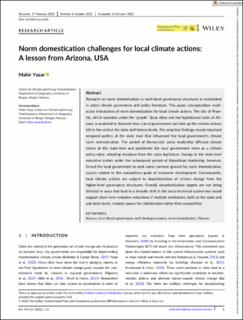Norm domestication challenges for local climate actions: A lesson from Arizona, USA
Journal article, Peer reviewed
Published version

Åpne
Permanent lenke
https://hdl.handle.net/11250/3054730Utgivelsesdato
2022Metadata
Vis full innførselSamlinger
- Department of Geography [627]
- Registrations from Cristin [9489]
Sammendrag
Research on norm domestication in multi-level governance structures is overlooked in urban climate governance and policy literature. This paper conceptualizes multi-scalar interactions of norm domestication for local climate actions. The city of Phoenix, which operates under the “purple” (blue cities and red legislatures) state of Arizona, is analyzed to illustrate how a local government can take up the climate actions left in the void at the state and federal levels. The empirical findings reveal important temporal politics at the state level that influenced the local government's climate norm domestication. The period of Democratic party leadership diffused climate norms at the state-level and positioned the local government more as a climate policy-taker, adopting decisions from the state legislature. Swings in the state-level executive orders under the subsequent period of Republican leadership, however, forced the local government to seek some common ground for norm domestication, usually related to the nonpartisan goals of economic development. Consequently, local climate actions are subject to depoliticization of climate change from the higher-level governance structures. Overall, decarbonization targets are not being directed in ways that lead to a broader shift in the socio-technical system but would support short-term emission reductions if multiple institutions, both at the state and sub-state levels, created spaces for collaboration rather than competition.
